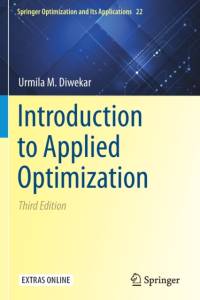Om Introduction to Applied Optimization
Intended for advanced undergraduate/graduate students as well as scientists and engineers, this textbook presents a multi-disciplinary view of optimization, providing a thorough examination of algorithms, methods, techniques, and tools from diverse areas of optimization. Linear programming, nonlinear programming, discrete optimization, global optimization, optimization under uncertainty, multi-objective optimization, optimal control, and stochastic optimal control are introduced in each self-contained chapter, with exercises, examples, and case studies, the true gems of this text. This third edition includes additional content in each chapter designed to clarify or enhance the exposition, and update methodologies and solutions. A new real-world case study related to sustainability is added in Chapters 2¿7. GAMS, AIMMS, and MATLAB® files of case studies for Chapters 2, 3, 4, 5, and 7 are freely accessible electronically as extra source materials. A solutions manual is available to instructors who adopt the textbook for their course.
From the reviews:
This work is definitely a welcome addition to the existing optimization literature, given its emphasis on modeling and solution practice, as well as its ¿user-friendly¿ style of exposition. ¿ János D. Pintér, European Journal of Operations Research, Vol. 177, 2007
Urmila Diwekar¿s book on applied optimization is one of the few books on the subject that combines impressive breadth of coverage with delightful readability. In her exposition of concepts and algorithms in the major areas of optimization, she always goes to the heart of the matter and illustrates her explanations with simple diagrams and numerical examples. Graduate and undergraduate students, who constitute part of the target audience, should find this a very useful book. ¿ Jamshed A. Modi, Interfaces, Vol.36 (1), 2006
Optimization is a rich field with a strong history; this book nicely introduces both, moving from very introductory material to challenging techniques toward the end ¿ Examples range from quite simplistic through realistic difficult scheduling problems. Some examples resurface in different chapter with twists to demonstrate how different techniques are required for differing data and constraints. ¿ CHOICE, September 2004
Visa mer

